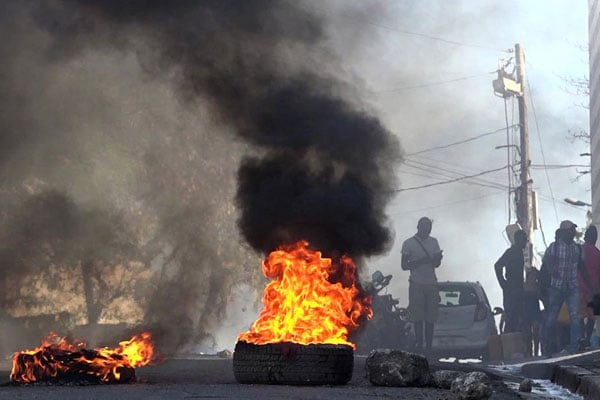Prime
Drones, drugs and destruction: The gangs plaguing Haiti

This screen grab taken from AFPTV shows tires on fire near the main prison of Port-au-Prince, Haiti, on March 3, 2024, after a breakout by several thousand inmates. At least a dozen people died as gang members attacked the main prison in Haiti's capital, triggering a breakout by several thousand inmates, an AFP reporter and an NGO said on March 3. PHOTO/ AFP
What you need to know:
- The UN Minustah peacekeeping mission deployed to Haiti between 2004 and 2017 claimed a number of victories against the gangs, but most experts believe that since the mission's conclusion, the gangs have boosted their firepower.
- Five gang leaders are under UN sanctions which include travel bans, asset freezes and arms embargos.
- Extortion is the main source of revenue for the gangs, with businesses subjected to classic protection rackets and "taxes" levied on cars using roads controlled by the criminal factions, Global Initiative said.
Haiti is no stranger to armed groups, and the gangs ravaging the country are highly organized and control vast arsenals of military weapons, presiding over a shadow economy of kidnapping for ransom and lucrative rackets.
Armed groups and politics
"Gangs in Haiti are a longstanding phenomenon. They link to a tradition of non-state armed groups that stretches back to the 1950s, with the development of the Tonton Macoutes (paramilitaries) by President Francois Duvalier," the non-profit Global Initiative Against Transnational Organized Crime said in a February report.

Gang leader Jimmy "Barbecue" Cherizier speaks into his phone before a mission, as two of his men watch, in Port-au-Prince, Haiti, March 5, 2024.PHOTO / AFP
Between 1957 and 1986, the dictator "Papa Doc" and then his son Jean-Claude Duvalier brutalized his people using the Tonton militias.
Then in the 2000s, the "phantom" street gangs were armed backers of then-president Jean Bertrand Aristide who sowed terror to secure his position.
In a report published in 2008, the US Institute for Peace said Haiti's gangs "although ostensibly criminal in nature... were an inherently political phenomenon (used) as instruments of political warfare."
"The influence of politicians and financial actors on gang activities is systemic," said the UN experts responsible for overseeing sanctions against the gang leaders in a September 2023 report.
200 increasingly professional gangs
Since the start of the 2000s the gangs have mostly been professional and organized.
Some 200 gangs have been operating in Haiti since then, according to the UN expert report.
It describes them as using "armed violence with more sophisticated firearms to control and influence neighborhoods and engage in illegal activities."
Their myriad crimes include running drugs and guns, extortion, kidnapping, murder, sexual violence and hijacking trucks.
The 23 major gangs active in the capital control some 80 percent of the territory and have split into two main coalitions -- "the G9 family" led by Jimmy "Barbecue" Cherizier, and the G-Pep.
But in recent days a number of their leaders have joined forces to attack key sites in the country in an effort to force out the prime minister.

Haitian citizens take part in the Dajabon border market at the Dominican Republic-Haiti border, as seen from Dajabon, Dominican Republic on March 8, 2024. PHOTO / AFP
Firepower
The UN Minustah peacekeeping mission deployed to Haiti between 2004 and 2017 claimed a number of victories against the gangs, but most experts believe that since the mission's conclusion, the gangs have boosted their firepower.
"Gangs are developing more sophisticated arsenals, and their firepower exceeds that of the Haitian national police," the UN experts warn.
While handguns and semiautomatic rifles remain the gangs' preferred tools, the experts note the emergence of light machine guns and armor-piercing hollow-point bullets.
Some gangs have even boosted their tactical advantage by recruiting former soldiers and police officers, while others have acquired drones to identify kidnap victims and surveil their territory.
'Most wanted'
Five gang leaders are under UN sanctions which include travel bans, asset freezes and arms embargos.
"Barbecue", one of the most prominent faces of the violence plaguing Haiti, is considered the most powerful leader, whose gang is partly made up of former policemen like himself.
Johnson "Izo" Andre, leader of the 5 Segond gang and member of the G-Pep alliance, "has been playing an increasingly influential role," recruiting youngsters from shantytowns in return for money and food, the UN experts say.

Haitian Prime Minister Ariel Henry, speaks to students during a public lecture on bilateral engangement between Kenya and Haiti, at the United States International University (USIU) Africa, in Nairobi on March 1, 2024. PHOTO / AFP
Vitelhomme Innocent, head of the Kraze Barye gang, is also on the UN list, and is on the FBI's most wanted list with agents offering $2 million for information leading to his arrest.
Shakedowns and smuggling
Extortion is the main source of revenue for the gangs, with businesses subjected to classic protection rackets and "taxes" levied on cars using roads controlled by the criminal factions, Global Initiative said.
To get in or out of Port-au-Prince, "you can't take the car and go freely to other parts of the country," said Ulrika Richardson, the UN's humanitarian coordinator in Haiti.
The country has also seen an uptick in arms trafficking since 2021, with weapons primarily sourced from the US, according to the UN Office on Drugs and Crime.





